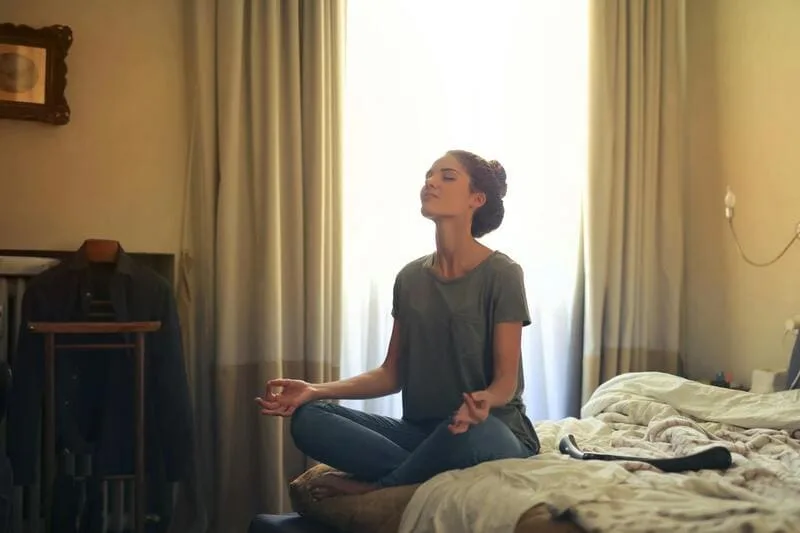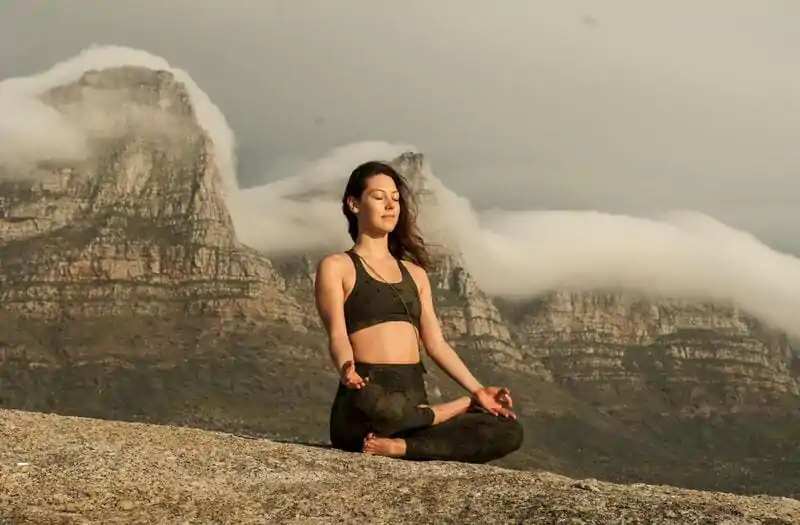Finding a moment of peace can seem like a distant dream in a world that often feels like it’s moving at lightning speed. Yet, the solution might be simpler and more accessible than we think. Meditation, a practice as old as time, holds the key. In just 10 minutes a day, meditation can reduce stress and anxiety, offering a haven of tranquility in our hectic lives. How? Let’s find out.
The Global Rise of Meditation: A Gateway to Well-being
As we explore the various benefits of meditation, it’s fascinating to observe its journey from ancient traditions to a globally embraced practice. Originating from spiritual and religious contexts in regions like India, meditation has traversed continents. It has evolved into a universally accepted tool for enhancing mental health and well-being.

Its core premise, that meditation can reduce stress and anxiety, resonates deeply in our fast-paced, modern world. People everywhere are turning to meditation to find a sense of calm and balance amidst life’s turmoil. Its appeal lies in its simplicity and accessibility, making it a practice anyone can start.
Indeed, to start your meditation practice, one doesn’t need elaborate equipment or extensive training; a few quiet minutes and an open mind are all that’s required. As we further look into the transformative power of meditation, we’ll uncover how this ancient practice can bring profound changes in our contemporary lives, offering solace, clarity, and a deeper connection to ourselves.
Breathing Into Meditation: The First Step to Mindfulness
For those looking to embark on a meditation journey, mindful breathing practices often serve as the ideal starting point. Beginning a regular meditation practice can be daunting, with challenges like restlessness or feeling overwhelmed. However, focusing on the breath provides a simple, accessible entry into meditation.
Mindful breathing, the act of consciously observing and controlling our breath, is a gentle yet powerful tool. It anchors the mind in the present moment, making it easier to transition into deeper meditative states. This practice helps cultivate an initial layer of focus and calm, preventing feelings of frustration or the urge to give up.
As a fundamental element of meditation, incorporating breathing exercises eases us into practice and lays the groundwork for a sustainable and rewarding meditation routine. It helps gradually unfold the full benefits of mindfulness and tranquility in our lives.
Unwinding the Mind: The Power of Presence
At the heart of reducing stress and anxiety through meditation lies the concept of being entirely present. Our minds, often mired in thoughts of the past and future, seldom find reprieve in the current moment. Meditation introduces us to this art of presence, teaching us to observe our thoughts without entanglement.
However, keep in mind that meditation and mindfulness are not the same, yet they complement each other. While meditation is a structured practice, mindfulness is an ongoing state of awareness, contributing uniquely to reducing stress.
This ability to stay in the now, cultivated through meditation, helps in distancing ourselves from stress-inducing thoughts. It leads to a calmer and more focused mind. With consistent practice, it’s a skill that extends beyond the meditation cushion into our daily life, offering a sanctuary of peace in our otherwise hectic existence.
Emotional Clarity: Understanding and Managing Feelings
One of the fundamental reasons why people meditate is to gain insight into their emotional selves. Meditation isn’t just about achieving a state of relaxation. On top of that, it’s an introspective journey that allows us to confront and understand our feelings. Stress and anxiety often stem from unmanaged emotions, and meditation offers a unique vantage point to observe these without judgment.

This self-awareness is crucial in effectively identifying and developing strategies to manage emotional triggers. By regularly engaging in meditation, we cultivate an ability to recognize and respond to our emotions in healthier ways. This process of understanding and managing feelings is key to mitigating stress and anxiety, empowering us to navigate our emotional landscape with more clarity and composure.
Harmonizing Body and Mind: The Relaxation Response
Meditation invokes the body’s relaxation response, counteracting stress’s physical effects. Focusing inward, we trigger a cascade of physiological changes: our breathing deepens, our heart rate slows, and our blood pressure drops. This response is the body’s way of reversing the stress response.
Over time, regular meditation can lead to long-term health benefits, including reduced risk of stress-related illnesses. The link between a calm mind and a healthy body is undeniable, illustrating how mental serenity directly influences physical well-being.
Building Resilience: Strengthening Mental Fortitude
Enhancing our mental resilience through meditation is akin to building physical strength through exercise; it’s a gradual process that requires consistency and, sometimes, guidance. Just as regular meditation fosters a robust mental state capable of withstanding stress and anxiety, seeking professional help can significantly amplify these benefits.
Therefore, exploring available resources can be immensely helpful for those new to meditation or looking to deepen their practice. A practical step in this direction is to sign up for free live guided meditations. These sessions, often led by experienced practitioners, provide structured guidance, helping individuals navigate the nuances of meditation.
This support can be pivotal in developing a strong, resilient mindset. Engaging in guided meditations enriches the practice and connects individuals with a community, reinforcing their journey toward building mental fortitude and emotional stability.
Cultivating Positivity: Shifting Perspectives
Meditation fosters a positive mindset, which is crucial in combating stress and anxiety. The practice encourages us to focus on positive thoughts and emotions, slowly shifting our perspective from negative to positive.

This change in mindset helps in reducing the frequency and intensity of stress and anxiety. Over time, meditators often find that they naturally gravitate towards positive thoughts, making it easier to handle challenging situations with a more optimistic outlook.
Meditation Can Reduce Stress and Anxiety: Embracing Serenity
As we navigate the complexities of modern life, embracing meditation emerges as a beacon of hope for mental well-being. It’s not merely a temporary escape but a transformative practice. Through dedicated, daily meditation, we unlock the potential to profoundly reshape our experiences, testifying to the fact that meditation can reduce stress and anxiety. Always keep in mind that this practice is more than a series of techniques. It’s also a journey towards inner peace, emotional balance, and resilience.
As we cultivate a habit of mindfulness and stillness, we confront life’s challenges with a steadier heart and nurture a sense of profound serenity that permeates our entire being. Therefore, there’s no excuse not to start dedicating 10 minutes of your days to this simple yet amazing practice. Trust us, you’ll feel the effects even after your first try! So why not give it a try and see the benefits for yourself? Sign up for one of our online Inner Peace Sessions and discover how meditation can change your life for the better!







